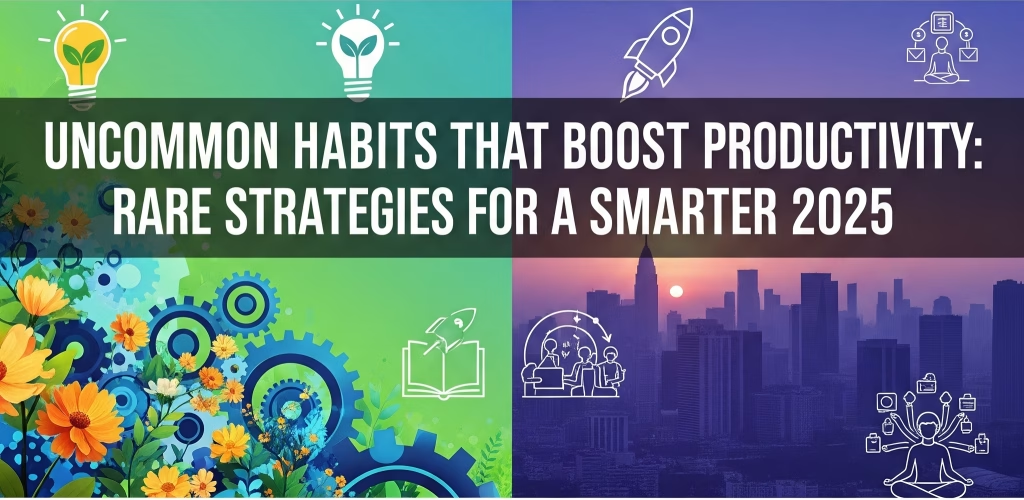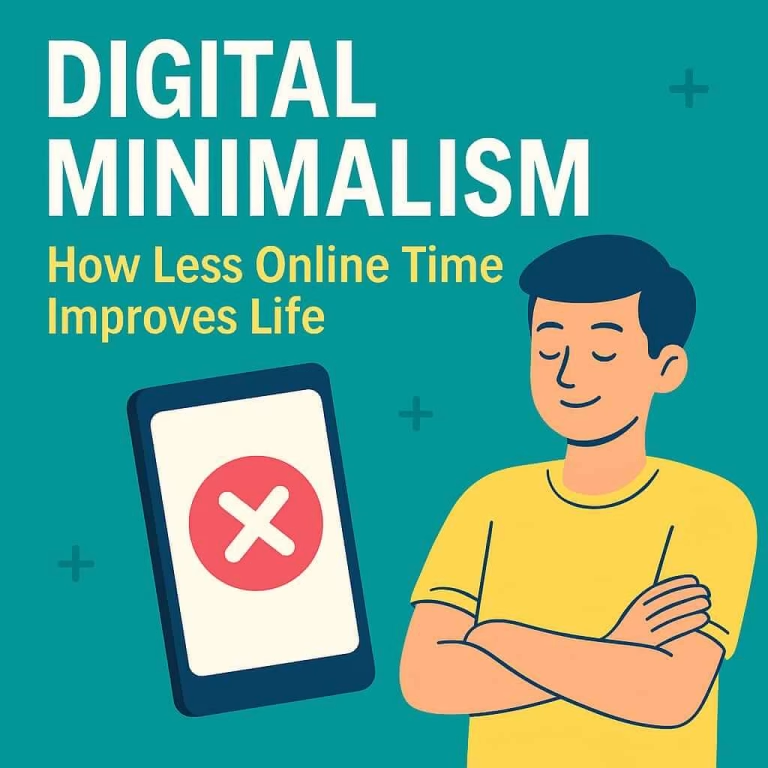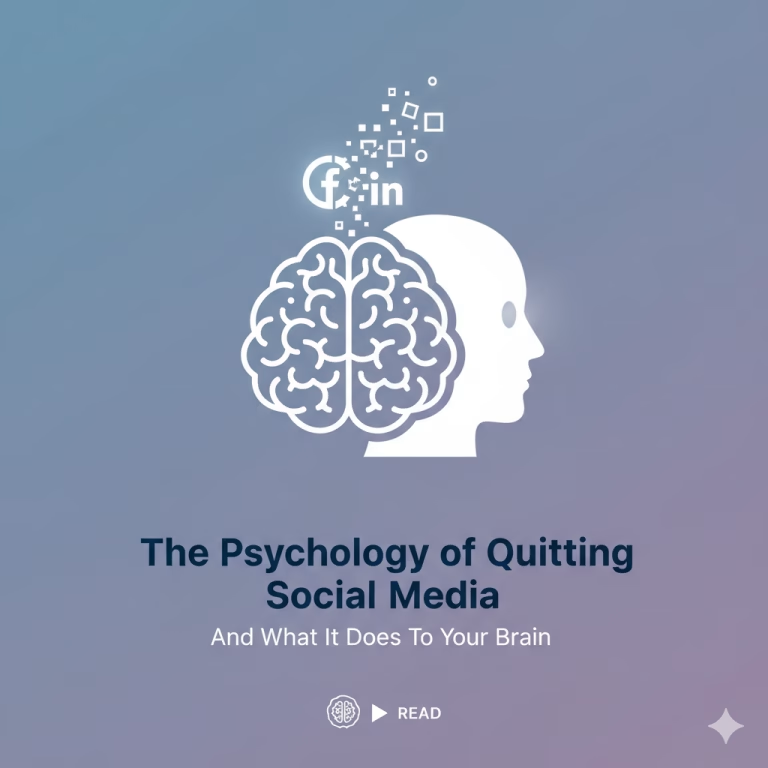
Introduction to Uncommon Habits That Boost Productivity – Why Productivity Needs a Fresh Approach
Uncommon Habits That Boost Productivity have become essential in today’s fast-paced world, as productivity continues to be a central focus for achieving success and efficiency. From industrial revolutions to the digital era, humanity has been obsessed with doing more in less time. Every year, countless books, apps, and coaching programs promise to “unlock your potential” and help you get things done. Yet despite this, many people in 2025 still feel exhausted, distracted, and unfulfilled.
Why? Because the productivity advice that circulates most widely is repetitive. Wake up early, make to-do lists, avoid procrastination—everyone has heard these tips a thousand times. They are not useless, but they rarely address the deeper challenges of a modern lifestyle: information overload, shrinking attention spans, and the mental fatigue that comes with being always online.
That’s where uncommon habits enter the scene. These are not the same recycled tips. They are subtle practices backed by psychology, neuroscience, and the lived experiences of high performers across industries. They may feel unusual at first, but once integrated, they can reshape the way you work and think.
This article explores 15 rare productivity habits that go beyond mainstream hacks. If you’re tired of “wake up at 5 AM” advice, these habits will give you a new, smarter way to work in 2025.
The Psychology of Productivity: Why Common Advice Fails
In the topic of Uncommon Habits That Boost Productivity, we will discuss
- One-size-fits-all thinking. Not everyone is a morning person. Forcing early wakeups can actually reduce productivity for night owls.
- Task obsession over energy awareness. Most advice focuses on “what to do” rather than “when you’re mentally strongest to do it.”
- Digital overload. Our devices are productivity killers disguised as productivity tools. Without strong boundaries, even a calendar app can become another distraction.
- Motivation dependency. Many common tips rely on bursts of motivation. Real productivity depends more on systems and habits than on willpower.
Understanding these flaws makes it easier to appreciate the power of less common but highly effective practices.
15 Uncommon Habits That Actually Boost Productivity
Habit 1: Practicing “Reverse Planning”
Instead of starting your day by listing tasks, start with your end goal and work backward. Ask:
- “If today were a success, what would I have completed?”
- “What actions directly lead to that outcome?”
This reverse approach keeps you from drowning in endless tasks and directs your energy toward what truly matters.
Habit 2: Scheduled Daydreaming
Most people try to eliminate daydreaming. But neuroscience shows that structured mind-wandering sparks creativity and problem-solving. Schedule a 10-minute window to let your thoughts wander. Keep a notebook nearby—you’ll be surprised how often solutions emerge in this relaxed state.
Habit 3: Writing Daily “Anti-To-Do” Lists
Instead of only writing what you must do, write what you must avoid doing—checking notifications too often, opening unnecessary tabs, scrolling social media. Seeing these on paper creates awareness and strengthens discipline.
Habit 4: Using Background “Trigger Sounds”
Some people concentrate better with music, others in silence. But a little-known hack is using consistent sound triggers—for example, a specific white-noise track or instrumental playlist that you always play while working. Over time, your brain associates that sound with focus, creating a Pavlov-like response to get into deep work faster.
Habit 5: Practicing Micro-Naps Instead of Coffee
Caffeine gives energy but can disrupt sleep cycles and cause crashes. In contrast, a 15-minute nap restores alertness without side effects. NASA research even supports power naps for pilots. In 2025, when people rely heavily on energy drinks, learning to nap strategically is a competitive advantage.
Habit 6: Decluttering Mental Tabs (Single-Tasking Rituals)
Multitasking is a myth—it reduces efficiency by up to 40%. A powerful habit is creating a pre-task ritual: closing unused browser tabs, silencing your phone, and placing only the required tool in front of you. This ritual clears mental clutter and trains your brain to single-task with intention.
Habit 7: Nightly “Brain Download” Journaling
Many people struggle to sleep because their mind keeps replaying unfinished tasks. The solution? Spend 10 minutes each night writing down every worry, task, or idea that comes to mind. This brain download empties mental storage, reduces anxiety, and prepares you for a sharper tomorrow.
Habit 8: Practicing the “Five-Minute Rule” for Procrastination
When facing a daunting task, promise yourself to work on it for just five minutes. This small start often bypasses resistance, and momentum carries you forward. It’s one of the simplest yet most powerful tools for overcoming procrastination.
Just like in our earlier post “Digital Minimalism: How Less Online Time Improves Life”, many of these habits in “Uncommon Habits That Boost Productivity” focus on reducing unnecessary mental clutter. By combining minimalism with productivity, you create a system that supports long-term growth.
Habit 9: Walking Meetings (Instead of Sitting Ones)
Sitting for long periods drains energy and creativity. Transform short meetings into walking sessions, whether around your office or outdoors. Movement increases blood flow to the brain, improves mood, and sparks creative ideas. Tech leaders like Steve Jobs and Mark Zuckerberg famously used walking meetings to combine physical activity with strategic thinking.
Why It Works
- Engages body and mind simultaneously
- Prevents stagnation in long meetings
- Creates informal, open discussion environments
Habit 10: Practicing Intentional Digital Silence
In 2025, constant notifications are the productivity killer of our era. A rare habit of high performers is intentional digital silence:
- Set specific windows where phones, emails, and social media are off
- Use apps or device settings to enforce focus periods
- Combine with deep work sessions for maximum efficiency
This habit helps reclaim mental energy and prevents distractions from derailing your day.
Habit 11: Daily Gratitude for Completed Tasks
Gratitude is often associated with personal life, but its impact on productivity is underrated. Each day, write down 3 tasks you completed and appreciate your effort. This simple act:
- Reinforces progress over perfection
- Boosts motivation for future work
- Reduces stress by highlighting achievement
Even small accomplishments become meaningful, shifting your mindset from “never enough” to “I am progressing.”
Habit 12: Practicing “Energy Mapping” Instead of Time Blocking
Most productivity systems focus on scheduling hours. Energy mapping is tracking your mental and physical energy patterns throughout the day and scheduling tasks accordingly.
- High-energy periods → creative and demanding work
- Low-energy periods → routine or administrative tasks
- Unexpected dips → micro-breaks, short walks, or meditation
By syncing your tasks with your energy, you work smarter, not harder.
Habit 13: Using an Alter-Ego for Confidence and Focus
Some high performers create a temporary persona to tackle difficult tasks. Think of it as an alter-ego:
- Gives you the courage to face challenges
- Reduces self-doubt or fear of failure
- Creates psychological separation from distractions
Actors and athletes often use this technique; in the workplace, it can make presentations, negotiations, or creative sessions more effective.
Habit 14: Micro-Adventures on Weekends for Creativity Boost
Productivity isn’t just about work; creativity fuels efficiency. A micro-adventure—exploring a new park, visiting a museum, or taking a photography walk—resets your mind and provides novel experiences.
- Sparks creative thinking
- Reduces burnout
- Provides new perspectives to solve work problems
Even short, low-cost activities can have outsized effects on your mental clarity and innovation.
Habit 15: Practicing “Slow Thinking” Before Big Decisions
In a world of constant urgency, rushing decisions are a common trap. Slow thinking—pausing, analyzing, and considering multiple angles—leads to better outcomes with less stress.
- Helps avoid reactive mistakes
- Encourages thorough evaluation of risks and opportunities
- Trains your mind to resist impulsive choices
Incorporating slow thinking into decision-making routines reduces errors and creates confidence in your judgment.
How to Integrate These Habits into Your Daily Routine
Introducing 15 new habits may seem overwhelming, but integration is possible with a structured approach:
- Start Small: Pick 1–2 habits per week. Don’t attempt all 15 at once.
- Anchor Habits: Tie new habits to existing routines. For example, practice gratitude after your morning coffee.
- Use Reminders: Calendar alerts, sticky notes, or digital habit trackers help reinforce consistency.
- Monitor Progress: Track improvements in focus, output, and mental clarity.
- Reflect Weekly: Evaluate what works and adjust accordingly. Reflection helps internalize habits faster.
Consistency over intensity is the key. Even practicing half of these uncommon habits regularly will create significant improvements over time.
Lessons from High Performers Who Apply Uncommon Habits That Boost Productivity
Top CEOs, scientists, and creators often credit unusual routines for their achievements.
- Elon Musk schedules work by energy mapping
- Bill Gates practices scheduled “think weeks” for reflection
- Marie Kondo declutters mental and physical spaces to maintain focus
The common thread: they don’t blindly follow mainstream advice. They experiment, adapt, and refine uncommon habits that suit their lifestyle and goals.
Common Mistakes to Avoid When Practicing New “Uncommon Habits That Boost Productivity”
- Trying everything at once: Leads to burnout and abandonment
- Ignoring self-reflection: Habit formation requires evaluation
- Focusing on perfection: Minor failures are natural; consistency matters more
- Neglecting rest and energy cycles: Productivity is meaningless without balance
Being mindful of these pitfalls ensures that your uncommon habits actually translate into sustainable improvements.
Long-Term Benefits: Beyond Productivity
These habits don’t just make you more efficient—they enhance:
- Mental clarity: Reduced clutter and stress
- Creativity: Exposure to novel experiences and thinking patterns
- Emotional resilience: Gratitude, reflection, and slow thinking cultivate calm
- Physical health: Walking meetings, micro-naps, and movement improve overall energy
Ultimately, productivity becomes a holistic lifestyle, not just a list of tasks completed.
For readers who want to reduce mental clutter even further, check out our earlier post: “Digital Minimalism: How Less Online Time Improves Life.” is same like the post Implementing both digital minimalism and Uncommon Habits That Boost Productivity creates a powerful synergy.
Conclusion on Uncommon Habits That Boost Productivity – A Rare Path to Smarter Living
By now, you’ve explored 15 uncommon habits that boost productivity, from reverse planning and scheduled daydreaming to energy mapping and micro-adventures. These practices might feel unusual, even unconventional, but that’s exactly why they work. In a world saturated with recycled advice, rare habits create an edge.
The central lesson is that productivity is not just about doing more, but about doing smarter, with intention, and in harmony with your energy, creativity, and mental clarity. Mainstream strategies—early mornings, strict schedules, relentless to-do lists—ignore the deeper mechanics of how the mind actually functions.
Integrating uncommon habits into your life can transform not only how much you get done but also how you feel while doing it. You’ll notice:
- Less mental clutter
- More focused attention
- Enhanced creativity
- Greater confidence in decision-making
- Balanced energy across the day
Actionable Takeaways
To implement these Uncommon Habits That Boost Productivity effectively, follow a step-by-step plan:
1. Choose Your Entry Points
Pick 2–3 habits that feel most accessible. For example:
- Habit 7: Nightly Brain Download Journaling
- Habit 5: Micro-Naps Instead of Coffee
- Habit 12: Energy Mapping
Starting with a few prevents overwhelm and allows consistent practice.
2. Track Progress
Maintain a journal or digital tracker. Note:
- When you practiced the habit
- Immediate effects on focus or energy
- Observations about improvements or challenges
Tracking encourages accountability and provides motivation when results are gradual.
3. Anchor Habits to Existing Routines
Habit formation is faster when tied to something you already do. Examples:
- Write an anti-to-do list after your morning coffee
- Schedule intentional digital silence during lunch breaks
- Practice gratitude immediately after completing key tasks
These anchor points create automatic triggers for your habits.
4. Reflect Weekly
Dedicate 15–20 minutes each week to review:
- Which habits are working?
- Which need adjustments?
- Which should be replaced or rotated out?
Reflection strengthens habit retention and helps adapt them to your lifestyle.
5. Scale Gradually
Once initial habits stick, add 1–2 new ones per week. Over a few months, you can integrate all 15 habits without feeling burdened. Consistency beats intensity.
Real-Life Scenarios for Uncommon Habits That Boost Productivity
Scenario 1: The Knowledge Worker
Imagine a knowledge worker, constantly juggling emails, meetings, and project deadlines. Implementing energy mapping allows them to schedule high-focus tasks in peak energy hours. Micro-naps replace mid-afternoon coffee, improving alertness without crashes. Over a month, the worker completes projects faster and feels less stressed.
Scenario 2: The Creative Professional
A writer or designer struggles with inspiration and deadlines. Scheduled daydreaming sparks creativity, while micro-adventures on weekends provide new perspectives. Using a trigger sound playlist helps enter deep focus mode instantly. Productivity increases, and work quality improves because creativity is nurtured alongside efficiency.
Scenario 3: The Entrepreneur
An entrepreneur faces unpredictable tasks daily. Reverse planning ensures critical goals are prioritized. Walking meetings stimulate creative solutions, and intentional digital silence keeps distractions at bay. Daily gratitude reinforces progress, reducing burnout.
These scenarios show how uncommon habits adapt across professions, making them versatile tools for 2025.
Integrating With Your Broader Life Strategy
For maximum results on Uncommon Habits That Boost Productivity, combine these habits with:
- Digital minimalism: Reduce unnecessary screen time and information overload
- Side hustles and projects: Prioritize tasks that align with long-term goals (see our post: Side Hustles in 2025 – Rare Ideas that Actually Work)
- Continuous learning: Engage in new skills, reading, and challenges that stimulate your mind
Together, these elements create a holistic framework for personal growth, efficiency, and sustainable productivity.
The Long-Term Vision
Incorporating Uncommon Habits That Boost Productivity is more than a temporary experiment—it’s a lifestyle transformation. Over months and years, you will notice:
- Reduced mental clutter: By offloading unnecessary thoughts and distractions
- Enhanced decision-making: Through slow thinking and energy-based planning
- Greater creativity: Through micro-adventures and structured daydreaming
- Stronger resilience: Through gratitude, reflection, and mindful breaks
This is the future of productivity— Uncommon Habits That Boost Productivity less rigid, more personalized, and in harmony with human psychology.
Final Thoughts on Uncommon Habits That Boost Productivity
Mainstream productivity tips have their place, but for those seeking real, sustainable growth, uncommon habits provide a competitive edge. By experimenting, tracking, and refining these practices, you are not just increasing output—you’re enhancing the quality of life while achieving your goals.
In 2025, when distractions are endless and attention is scarce, the rare habits you adopt now will determine how efficiently, creatively, and joyfully you navigate your personal and professional life.
Start small, stay consistent, and embrace the uncommon path. Your future self will thank you.
Suggested Posts realted to Uncommon Habits That Boost Productivity
- Digital Minimalism: How Less Online Time Improves Life – Reduce mental clutter for sharper focus
- Side Hustles in 2025 – Rare Ideas that Actually Work – Channel productivity into meaningful projects
Uncommon Habits That Boost Productivity
Please comment and share so we can bring you more topics like Uncommon Habits That Boost Productivity, helping you enhance your daily life and boost creativity







One Comment